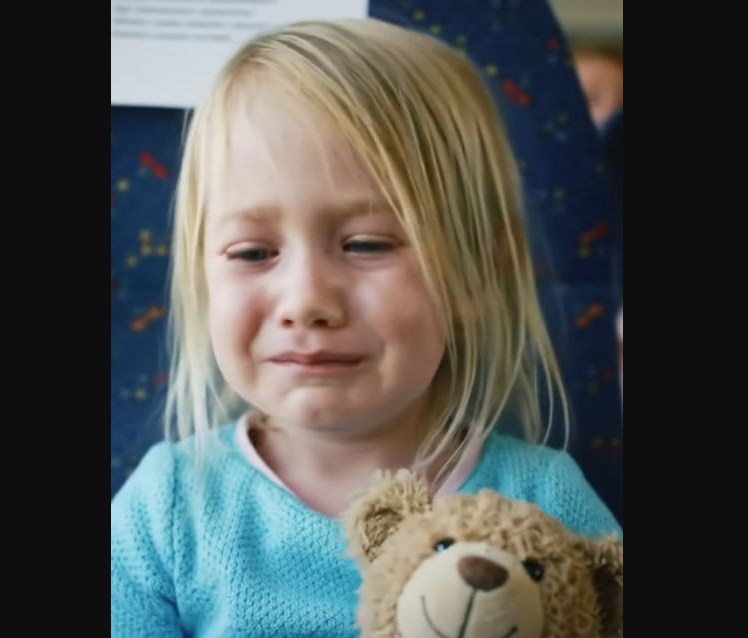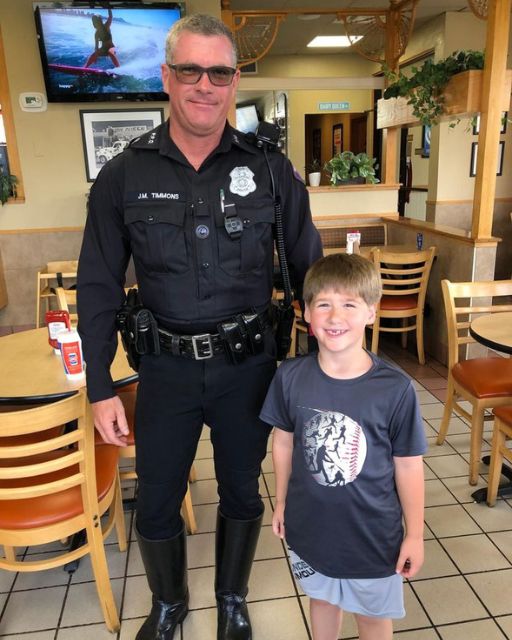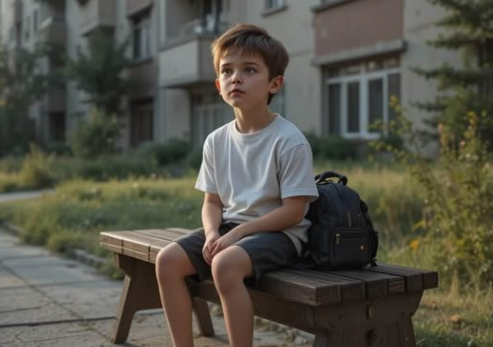It was among the most peculiar shifts of my professional life—and as an overnight train conductor, I have witnessed some truly bizarre occurrences. The train had just departed the station, the night was serene, and most passengers had settled into their seats. My colleague and I had completed our routine checks, verified tickets, and everything appeared to be proceeding smoothly.
Then, as I made my way towards the rear car to take a short respite, I heard an unusual sound. A kind of muffled whimper. Perhaps like a small puppy, or someone weeping very softly. It was emanating from the lavatory in the final car, and I distinctly recall thinking, “Did someone bring an animal on board and conceal it?”
I gently tapped on the door. “Hello? Is everything alright in there?”
There was no response.
I paused briefly, then knocked again, slightly more firmly. Still nothing. That is when I decided to use my master key. The door slowly swung inward, and what I beheld made my heart suddenly leap.
There, seated on the closed toilet lid, was a tiny girl—she could not have been older than six. Her knees were drawn up to her chest, and her small arms were wrapped tightly around a faded, one-eyed teddy bear. Her face was blotchy from crying, and she looked up at me like a startled deer caught in headlights.
I crouched down, making every effort to sound composed. “Hey there, sweetie. I’m Maya. What is your name?”
She sniffled, rubbed her nose on her sleeve, and mumbled, “Ella.”
“Hi, Ella. Are you alright? Where are your parents?”
She offered no reply. She simply hugged her teddy bear more tightly and averted her gaze.
I could discern that she was utterly terrified. And not merely the kind of fear children experience when they are lost in a supermarket. This felt more profound. As though she had been fleeing from something. Or someone.
I glanced up and down the deserted hallway. “Alright, Ella, I am going to assist you, okay? But we cannot remain in here all night.”
She hesitated, but when I extended my hand, she finally stood. She was so remarkably small. She barely reached my waist. She wore a puffy red jacket that was clearly too large for her and mismatched socks beneath small pink sneakers.
I led her to the compact staff area at the back of the train and seated her on a stool. I poured her some water and offered her a biscuit from my lunch bag. She accepted it without uttering a word.
As she quietly nibbled, I said gently, “You are not in any trouble, I promise. But I need to comprehend how you boarded the train. Were you accompanied by someone?”
She shook her head.
“You came alone?”
She nodded.
“How did you pass through the gate?”
She looked up at me, finally making eye contact. “I followed a group of people. No one noticed me.”
I leaned back, my heart aching. We were at least an hour’s journey from the city by then, speeding through the countryside. There was no simple way to immediately turn back or contact someone to pick her up.
I alerted my colleague, Tom, and together we contacted the authorities at the subsequent station. But I could not simply abandon her to wait with strangers.
As the train continued its journey, I remained by Ella’s side. I recounted amusing anecdotes about eccentric passengers and demonstrated how the intercom functioned. Slowly, she began to relax. She even smiled faintly when I showed her how to produce the “ding-dong” sound with the announcement bell.
Then, unexpectedly, she inquired, “Are you a mother?”
I blinked. “No, I am not.”
“You speak like a mother,” she said quietly. “Not like a stranger.”
That statement resonated deeply within me.
We sat in silence for a period, with only the train’s gentle hum and the occasional bump of tracks beneath us. I did not press her for more information. But eventually, she began to speak.
“My mommy… she left,” she stated simply.
“Left?”
“She said she had to go somewhere far away. She told me to be brave. And then she never returned.”
I felt a lump form in my throat. “Where did this occur, sweetie?”
“At the station. A lady was shouting at her. Mommy said she would come back. But she didn’t.”
“Was the lady… unkind to your mom?”
She nodded. “She had a badge. She said my mom had to go with her.”
That gave me pause. A badge? Was it the police? Social services?
“Do you reside with your mommy?”
“I did. But then they arrived. They said I had to stay with a new family. But I did not like it there. They said I could not take Teddy. So I escaped.”
I looked at the bear clutched in her arms. Its fur was worn, the stuffing loose in places. But I could understand why she would cling to it. It was likely the sole constant she had remaining.
“Ella, do you recall your mother’s name?”
She paused, contemplating intensely. “Serena.”
“And your last name?”
“Ardelean,” she said proudly. “Like a princess’s name.”
That was sufficient to initiate a trace. I quickly jotted it down, my heart pounding. The notion that this tiny girl had slipped through so many systemic cracks… it filled me with both anger and sorrow.
When we pulled into the next major station, a pair of officers were waiting. But instead of simply handing her over and departing, I remained. I meticulously explained everything, showed them the notes I had taken, and insisted I be permitted to stay with her until someone from child services arrived.
The officers were kind. One of them, a woman named Daria, knelt beside Ella and spoke to her gently in Romanian. Ella brightened—her father’s family, I later learned, was from Romania, and she spoke some of the language.
Daria promised to investigate her mother’s situation. Apparently, there had been a series of hurried detentions at that station weeks earlier—related to visa issues. It was entirely plausible Serena had been taken into custody and Ella inadvertently left behind in the ensuing chaos.
I rode the remainder of the route with a tight knot of anxiety in my stomach. When my shift concluded, I found myself unable to sleep. I continuously checked my phone, hoping for news. Something within me simply could not let it go.
Three days later, I received a call from Daria.
“Maya, we found her,” she stated.
“Who? Serena?”
“Yes. She is currently being held at a migrant holding center. They were unaware she had a child with her at the time of arrest. She consistently inquired about her daughter, but no one believed her. They thought she was fabricating the story.”
My heart felt as though it would burst. “And Ella?”
“She is currently with a temporary foster family. But we are initiating the reunification process.”
I asked if I could see her. Daria readily agreed.
The reunion was not the dramatic cinematic scene one might anticipate. Serena was thin, utterly exhausted, her eyes red-rimmed. But when Ella saw her, she rushed into her arms as if no time had elapsed. They embraced and sobbed quietly in the small waiting room, and even I found myself unable to suppress my tears.
Serena looked up at me. “Thank you. You believed her. You believed me.”
“I simply listened,” I responded.
A Small Pouch, A Big Impact
A month later, I received a small envelope in the mail. Inside was a drawing—a wobbly sketch of a train, a lady with curly hair, and a little girl holding a teddy bear. In crayon, Ella had scrawled: Maya is a hero. Teddy says thank you too.
I affixed that drawing to my refrigerator.
A few months elapsed. Serena and Ella relocated to a women’s shelter that assisted mothers in reuniting with their children and re-establishing their lives. I checked in periodically. They were making progress. Slowly, steadily.
Then came the unexpected twist.
One night, as I was boarding my usual train, a familiar voice called out, “Maya!”
I turned. Ella came running towards me, this time wearing a neat small jacket and a wide grin. Serena followed, carrying a shopping bag.
“I made this,” Ella said, thrusting something into my hands.
It was a small fabric pouch—clearly handmade. A little unevenly stitched, but filled with evident affection. “It’s for your biscuits,” she explained. “So you don’t have to use a napkin.”
I laughed warmly. “That’s absolutely perfect.”
Serena smiled. “I secured a job. At the bakery near the station. We pass by here every Friday, and she insisted we look for you.”
As they departed, Ella turned back and waved vigorously. “I don’t hide anymore!”
I waved back, my eyes pricking with tears.
Sometimes, the most unassuming individuals impart the most profound lessons. About resilience. About unwavering faith. About the crucial importance of pausing, listening intently, and truly recognizing someone who might otherwise go unnoticed.
That night, as the train rumbled into the darkness, I clutched that small fabric pouch and reflected on how narrowly Ella had avoided being forgotten within the system. And how one fleeting moment—a sound from the lavatory, a gentle inquiry—had irrevocably altered the trajectory of her life.
So the next time something feels amiss, or someone appears lost, pause. Ask. Listen.
You might just become the person they remember eternally.




